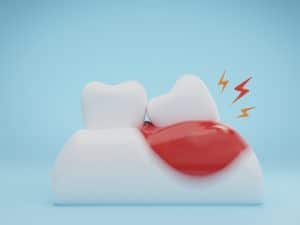Tooth sensitivity is a common dental issue that many people experience. It can range from mild discomfort to sharp pain, especially when consuming hot, cold, or sweet foods and drinks. While it can sometimes be a minor annoyance, it may also indicate a more serious underlying problem. This article explores the various causes of tooth sensitivity and when it might indicate a bigger dental issue.
What causes tooth sensitivity?
Tooth sensitivity arises when the delicate inner layer of the tooth, the dentin, is uncovered. This exposure can be caused by various factors, such as:
- Worn enamel: Over time, the protective layer of enamel on your teeth may wear down, exposing the sensitive dentin beneath.
- Gum recession: When gums recede, the roots of your teeth become exposed, leading to increased sensitivity.
- Dental procedures: Recent dental treatments, like fillings or cleanings, can temporarily make your teeth more sensitive.
- Diet: Acidic foods and drinks, such as citrus fruits, soda, or wine, can erode enamel and increase sensitivity.
- Brushing habits: Using a hard-bristled toothbrush or brushing too vigorously can wear down enamel and cause sensitivity.
While these factors may lead to occasional discomfort, they might not always point to a serious dental issue. However, persistent or severe sensitivity could be a sign of a more significant problem.
Can dental cavities lead to pain or sensitivity?
Dental cavities, also known as tooth decay, are one of the most common causes of tooth sensitivity. Cavities occur when bacteria in your mouth break down food particles, producing acids that erode the enamel on your teeth. Over time, this decay can lead to the following:
- Pain while chewing: As the cavity deepens, the inner pulp of the tooth may become exposed, causing discomfort when biting or chewing.
- Sensitivity to temperature: Cold or hot foods and drinks may trigger sharp pain due to the exposure of sensitive areas inside the tooth.
- Visible holes: Advanced cavities may be visible as dark spots or holes in the tooth, which can worsen sensitivity.
Is tooth sensitivity related to gum disease?
Gum disease, or periodontal disease, can contribute to tooth sensitivity in several ways. If you’re experiencing discomfort, it’s important to explore the causes of gum disease, as it can lead to further issues such as receding gums and tooth decay. Symptoms of the disease include:
- Bleeding gums: Gums may become irritated and bleed when brushing or flossing.
- Swollen or red gums: Inflamed gums are a common sign of gum disease.

- Receding gums: As the gums pull away from the teeth, the roots may become exposed, leading to sensitivity.
- Bad breath: If you’re constantly battling bad breath or a weird taste in your mouth, it might be a sign of gum disease.
How can a cracked tooth cause sensitivity?
A cracked tooth is another potential cause of discomfort. Cracks in the tooth can occur due to trauma, teeth grinding, or even chewing hard foods. When a tooth is cracked, it can lead to:
- Sharp pain: A cracked tooth may hurt when biting down or eating certain foods, especially those that are hard or chewy.
- Sensitivity to temperature: Like cavities, a cracked tooth can cause increased sensitivity to hot or cold foods and drinks.
- Pain when exposed to air: If the crack is deep enough, the sensitive nerve inside the tooth may be exposed to the air, causing discomfort.
How can you relieve tooth sensitivity at home?
While professional treatment is often necessary to address the root cause of tooth sensitivity, several home remedies can provide temporary relief:
- Use a desensitising toothpaste: Toothpaste designed for sensitive teeth contains compounds that block the pathways to the nerves, reducing pain.
- Avoid acidic foods: Reduce your consumption of citrus, soda, and other acidic foods that can exacerbate sensitivity.
- Use a soft-bristled toothbrush: A soft toothbrush helps reduce the abrasion on your teeth and gums, preventing further wear.
- Saltwater rinse: Rinsing your mouth with warm saltwater can help reduce inflammation and soothe sore gums.
There are several ways to relieve tooth pain at home. Still, these are temporary solutions, and a visit to your dentist for a proper diagnosis should follow.
When should you visit a dentist for persistent tooth pain?
If your tooth sensitivity is persistent or worsens over time, it’s important to see a dentist. Seek dental care immediately if:
- The pain lasts more than a few days.
- You experience swelling, fever, or pus near the affected tooth.
- Your sensitivity is severe, especially when biting or chewing.
- You have visible cavities or cracks in your teeth.
- You have experienced a traumatic injury to your mouth or teeth.

What treatments can help with tooth sensitivity?
Treating tooth sensitivity typically depends on the underlying cause. Some of the most common treatments include:
- Dental fillings: If a cavity is causing sensitivity, a filling can restore the tooth and protect it from further decay.
- Root canal therapy: In cases of severe tooth decay or infection, a root canal may be necessary to remove the infected tissue and save the tooth.
- Crowns: A dental crown may be used to cover a cracked tooth and protect it from further damage and sensitivity.
- Gum grafting: For patients with gum recession, a gum graft can cover exposed tooth roots and reduce sensitivity.
If you’re struggling to find relief from tooth sensitivity, it’s essential to visit a dentist as soon as possible to identify the underlying cause and prevent further discomfort.
How can preventative care reduce the risk of tooth sensitivity?
Preventative dental care is crucial for maintaining oral health and reducing the risk of discomfort. Regular check-ups and cleanings help catch issues early before they lead to pain or sensitivity. Practising good oral hygiene, such as brushing with fluoride toothpaste, flossing daily, and limiting sugar intake, can also prevent cavities and gum disease, both of which are common contributors to dental sensitivity.
Take the first step to a healthier smile!
If you’re experiencing tooth sensitivity or any other dental discomfort, don’t hesitate to book an appointment with the team at Marsfield Dental Care. Our experienced dentists are here to provide effective treatments and personalised care for your dental health. Our multilingual staff ensures a comfortable experience for patients from diverse backgrounds. With a focus on family-friendly services and advanced technology, including 3D-printed restorations, we ensure that you receive the highest standard of care in a convenient and comfortable setting.

